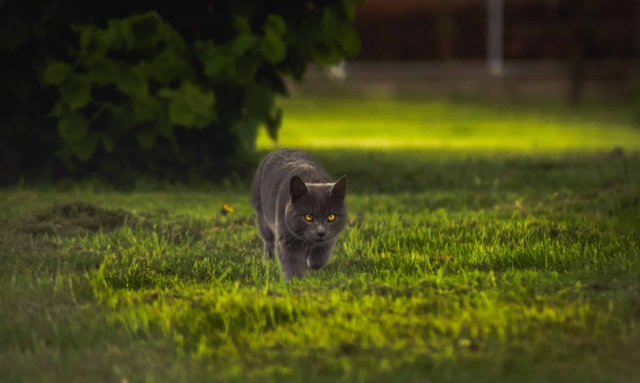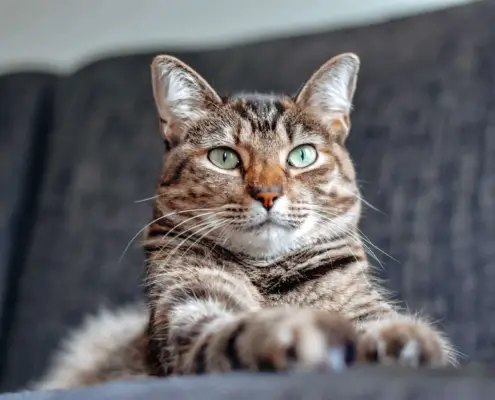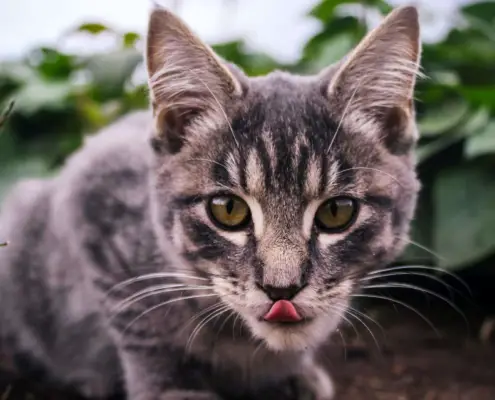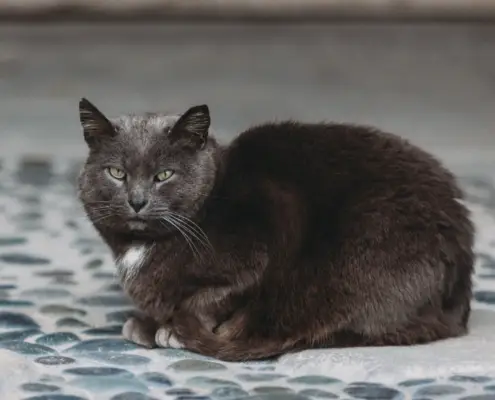
Cats are enigmatic creatures, known for their independent nature and peculiar habits. One such behavior that often perplexes cat owners is their penchant for eating grass. While it may seem strange, there are reasons behind this seemingly odd behavior. In this article, we will delve into the world of feline nutrition and explore why cats eat grass.
Common reasons why cats eat grass
There are several reasons why cats are drawn to munching on grass. One of the most common theories is that cats instinctively eat grass to aid in the digestion of their prey. In the wild, cats consume the entire body of their prey, including the stomach contents, which often consist of partially digested grass. By ingesting grass, cats are able to induce vomiting, which helps them expel any indigestible material from their stomachs.
Another reason why cats eat grass is to fulfill their nutritional needs. Grass is rich in fiber, which aids in digestion and helps prevent hairballs. Cats are meticulous groomers, and during their grooming sessions, they inevitably ingest a significant amount of fur. The consumption of grass helps to facilitate the passage of hairballs through their digestive system, reducing the risk of gastrointestinal blockages.
Additionally, some experts believe that cats eat grass as a form of self-medication. Grass contains essential nutrients, such as folic acid, which can help alleviate certain health issues in cats. When cats feel unwell or experience digestive discomfort, they may instinctively seek out grass to provide relief.
The benefits of cats eating grass
While the act of cats eating grass may seem peculiar, it actually offers several benefits for our feline companions. Firstly, as mentioned earlier, grass acts as a natural remedy for hairballs. By ingesting grass, the fiber helps to bind the loose fur in their digestive tract, allowing it to pass through their system more easily. This can prevent the formation of hairballs and alleviate any discomfort associated with them.
Moreover, grass can serve as a natural laxative for cats. If a cat is constipated or experiencing sluggish bowel movements, consuming grass can help stimulate their intestinal muscles and promote regular bowel movements. This can be particularly beneficial for older cats or those with underlying gastrointestinal issues.
In addition to its digestive benefits, grass also provides cats with mental and physical stimulation. The act of hunting and nibbling on grass mimics their natural instincts, helping to keep them mentally engaged and physically active. This can be especially important for indoor cats who may not have access to outdoor environments where they can engage in natural behaviors.
Is it safe for cats to eat grass?
While cats eating grass is generally considered safe, there are a few precautions that should be taken. First and foremost, it is essential to ensure that the grass your cat has access to is free from pesticides or harmful chemicals. Many lawns and gardens are treated with various substances that can be toxic to cats if ingested. Therefore, it is advisable to create a designated area with cat-friendly grass or provide them with specially grown grass indoors.
Furthermore, it is important to monitor the amount of grass your cat consumes. While a small amount can be beneficial, excessive grass intake can lead to vomiting or even digestive blockages. If you notice that your cat is consuming large quantities of grass or exhibiting any signs of distress after eating grass, it is advisable to consult with your veterinarian.
What to do if your cat eats too much grass
If your cat has consumed an excessive amount of grass and is experiencing vomiting or other digestive issues, there are a few steps you can take to alleviate their discomfort. Firstly, ensure that they have access to fresh water to prevent dehydration. If the vomiting persists or if you notice any signs of distress, it is crucial to seek veterinary attention promptly.
In some cases, your veterinarian may recommend withholding food for a short period of time to allow your cat’s stomach to settle. This can help prevent further irritation and allow their digestive system to recover. Additionally, your veterinarian may prescribe medication to alleviate any nausea or discomfort your cat may be experiencing.
How to prevent cats from eating toxic plants
To protect your cat from ingesting toxic plants while satisfying their grass-eating instincts, it is essential to create a safe environment for them. Start by identifying and removing any potentially harmful plants from your home and garden. Research the toxicity of common plants and ensure that you do not introduce any poisonous varieties into your cat’s living space.
Alternatively, you can provide your cat with cat-friendly grass indoors. There are specially designed grass kits available that allow you to grow safe grass for your cat to nibble on. This not only provides them with the benefits of grass consumption but also eliminates the risk of exposure to toxic plants.
Other natural remedies for digestive issues in cats
While grass consumption can be beneficial for cats with digestive issues, there are other natural remedies that can also help alleviate their discomfort. One such remedy is the incorporation of dietary fiber. Adding fiber-rich foods, such as pumpkin or psyllium husk, to your cat’s diet can promote healthy digestion and prevent constipation.
Probiotics can also be beneficial for cats with digestive issues. These beneficial bacteria can help restore the balance of gut flora and improve overall gut health. Consult with your veterinarian to determine the appropriate probiotic supplement for your cat’s specific needs.
Understanding your cat’s nutritional needs
In addition to understanding why cats eat grass, it is crucial to comprehend their overall nutritional needs. Cats are obligate carnivores, which means that their bodies are designed to derive essential nutrients from animal-based sources. A balanced diet for cats should consist primarily of high-quality animal protein, supplemented with essential vitamins and minerals.
It is important to avoid feeding cats a strictly vegetarian or vegan diet, as they require certain nutrients, such as taurine, which are only found in animal tissues. Failure to meet their nutritional requirements can lead to serious health issues, including heart disease and malnutrition.
Providing a balanced diet for your cat
To ensure that your cat receives a balanced diet, it is advisable to feed them a combination of wet and dry food. Wet food provides essential moisture and can help prevent urinary tract issues, while dry food helps to maintain dental health and provides additional nutrients.
When selecting cat food, look for brands that offer high-quality ingredients and meet the nutritional standards set by veterinary associations. Consult with your veterinarian to determine the appropriate feeding guidelines based on your cat’s age, weight, and overall health.
Conclusion
In conclusion, cats eating grass may seem like a peculiar behavior, but it is rooted in their instinctual needs and can offer several benefits. From aiding in digestion to providing mental and physical stimulation, grass consumption plays a vital role in a cat’s overall well-being. However, it is important to ensure that the grass is safe and monitor the amount consumed to prevent any potential health issues. By understanding your cat’s nutritional needs and providing a balanced diet, you can help support their overall health and happiness. So, embrace your cat’s grass-eating habits and provide them with a safe and enriching environment to thrive in.
If you enjoyed my article, I would appreciate you sharing it with your network.

Sima Ndlebe
Sima writes for CatBuzz. He is interested in Cats, Health and Fitness, and Entrepreneurship.
Published: 1 November 2023
Related Articles
Disclaimer
The content found on CatBuzz.org is presented on an "as is" basis and is intended for general consumer information and education purposes only. Any utilization of this information is voluntary and solely at the user's own risk.
None of the articles or content should be regarded as, or used in place of, veterinary medical advice, diagnosis, or treatment. The information provided on the website is purely for educational and informational intentions and should not be considered a substitute for professional guidance from a veterinarian or other qualified expert. The articles are designed to inform consumers about veterinary healthcare and medical matters that may impact their cat's daily life. It should be noted that this website and its services do not constitute the practice of any form of veterinary medical advice, diagnosis, or treatment. CatBuzz.org explicitly disclaims any liability for any direct or indirect damages or losses that may arise from the use of or reliance on the information contained within the content.
Consumers must consult a veterinarian, veterinary specialist, or another qualified veterinary healthcare provider when seeking advice regarding their cat's health or medical conditions. It is important not to ignore, avoid, or postpone seeking medical advice from a veterinarian or other qualified veterinary healthcare provider solely based on information obtained from this website. If you believe that your cat may be experiencing a medical issue or condition, it is imperative to promptly contact a qualified veterinary healthcare professional.



